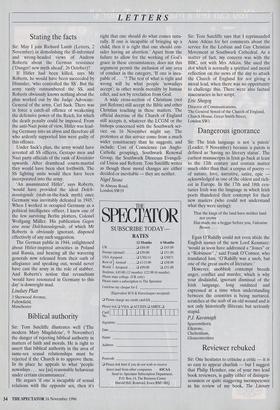Biblical authority
Sir: Tom Sutcliffe illustrates well (The modern Mary Magdalene', 9 November) the danger of rejecting biblical authority in matters of faith and morals. He is right to assert that biblical authority in the area of same-sex sexual relationships must be rejected if the Church is to approve them. In its place he appeals to what 'people nowadays .. . see [as] reasonable behaviour under certain circumstances'.
He argues 'if one is incapable of sexual relations with the opposite sex, then it's right that one should do what comes natu- rally. If one is incapable of bringing up a child, then it is right that one should con- sider having an abortion.' Apart from the failure to allow for the working of God's grace in these circumstances, does not this argument permit the inclusion of any area of conduct in the category, 'If one is inca- pable of . . . '? The test of what is right and wrong will be what people 'nowadays accept'; in other words morality by human edict, and not by revelation from God.
A wide cross-section of Christians (not just Reform) still accept the Bible and other Christian teaching in these matters. The official doctrine of the Church of England still accepts it, whatever the LCGM or the bishops concerned with the Southwark ser- vice on 16 November might say. The protesters at this service come from a much wider constituency than he suggests, and include: Cost of Conscience (an Anglo- Catholic grouping), Southwark Renewal Group, the Southwark Diocesan Evangeli- cal Union and Reform. Tom Sutcliffe writes as though these moral changes are either decided or inevitable — they are neither. Nigel Stone
36 Alwyne Road, London SW19


















































































 Previous page
Previous page